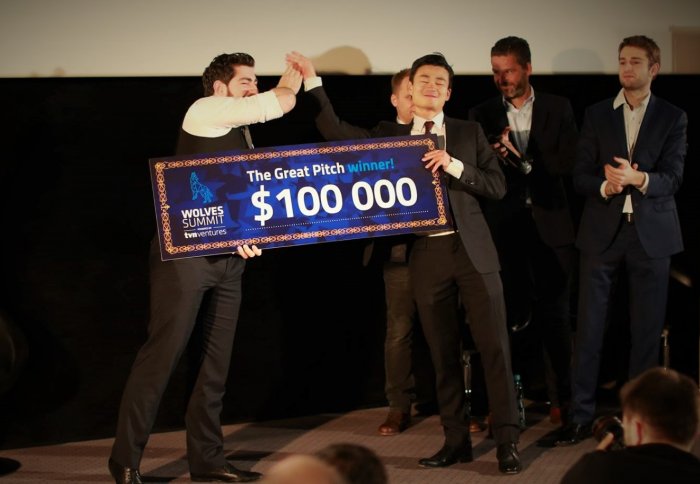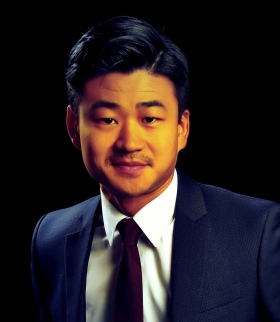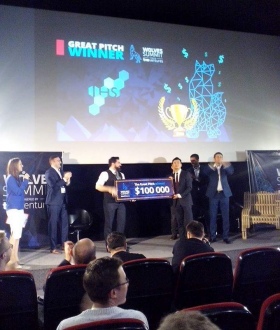Business School graduate wins $100K prize for 'toothbrush' that scans teeth

A team that has developed a device to let people monitor their own teeth for signs of decay has scooped a $100K prize.
Tim Tang, who graduated last month from Imperial College Business School’s MSc International Health Management programme, was a member of the Toothscan team, which beat 250 startup companies to win the large investment at the Wolves Summit. This major three day conference in Warsaw is attended by startups, investors, corporations and entrepreneurs from around the world.
Toothscan will be the first consumer product to allow people to scan their own teeth to detect problem areas before diseases develop. The product is designed to help people gain more control over their health – helping them avoid expensive and painful dental work later on. Shaped like a regular toothbrush, the device works by sending out a pulse of light which bounces off the enamel in people’s teeth and relays information back to the scanner. The data is then collected and fed into an accompanying app which can be used through a smartphone or a computer to give a report on the state of the user’s teeth.
Watch the video below to see how Toothscan works.
Tim Tang (pictured below) helped the Toothscan developers to create their business plan and the pitch for their company. Laura Singleton asked Tim for his reflections on winning the prize, the atmosphere at the conference and his experience of studying at the Business School.

My MSc group was looking for a research project as part of our Health Economics module. A former colleague and Ear, Nose and Throat surgeon, Dr Matt Lechner, told me about a startup he was working on and introduced me to the co-founders of Toothscan, Dimitree Marozau and Sergey Khurs.
Another product that the co-founders designed, Tesla Suit, also provided the inspiration for our final MSc project, which was a business plan competition. One of the assessors for the competition was Business School alumnus, Sivan Abenson, a full-time MBA graduate from 2013. She spoke to me afterwards about joining us and that’s how the current team was formed.
Who came up with the idea for Toothscan?
Sergey came up with the idea after his sister, who had just finished brushing her teeth, told him how great it would be if you could have a scanner to monitor your teeth for signs of decay. He built the initial prototype for Toothscan the next day.
 Describe the atmosphere at the conference and your pitching process
Describe the atmosphere at the conference and your pitching process
The conference is a three day event held at the Palace of Science and Culture in Warsaw. The venue was breathtaking and it was incredible to rub shoulders with entrepreneurs from all over the world. On the first day each team was required to give a three minute pitch to a panel of judges. We later found out we’d been selected for the shortlist and asked to come back on the second day to deliver the same pitch to the judges in front of an audience.
The finals were the most exciting, but daunting part of the competition. This time, we had to deliver our pitch to a panel of 30 judges. We were proud of our performance but never imagined we would win. We were absolutely thrilled to win such a large investment.
How do you plan to develop Toothscan with the prize money?
We are looking to do further research and development on the product and we hope that our success at the Wolves Summit will help us attract further investors to help grow the business. We were also shortlisted for last week’s Pitch@Palace competition and although we didn’t win, it was a fantastic opportunity to raise our profile.
How did your experience at Imperial help you prepare for the competition?
I was responsible for designing the pitch and mentoring the company’s CEO Dr Cemal Kavasogullari, who delivered the presentation. I had picked up great tips and techniques on how to prepare for presentations from my tutors at Imperial. My experience at Imperial gave me the skills and confidence to enter this competition – something I would never have dreamed of doing a year ago. I also learned a lot from the evening lectures by guest speakers and from the incredible startup community within the College.
What is your next venture?
Next month I plan to focus on launching a kickstarter campaign for Tesla Suit, a body suit that can monitor a person’s physical health (heart beat, blood pressure and joints) and lets users feel objects in virtual reality. I was asked by Dimitree and Sergey to work on this project after they found out about my background in health and rehabilitation. I’m also launching a new head and neck cancer charity (AGA-ENT) with my former colleague, Dr Matt Lechner.
Article text (excluding photos or graphics) © Imperial College London.
Photos and graphics subject to third party copyright used with permission or © Imperial College London.
Reporter
Laura Singleton
Communications Division